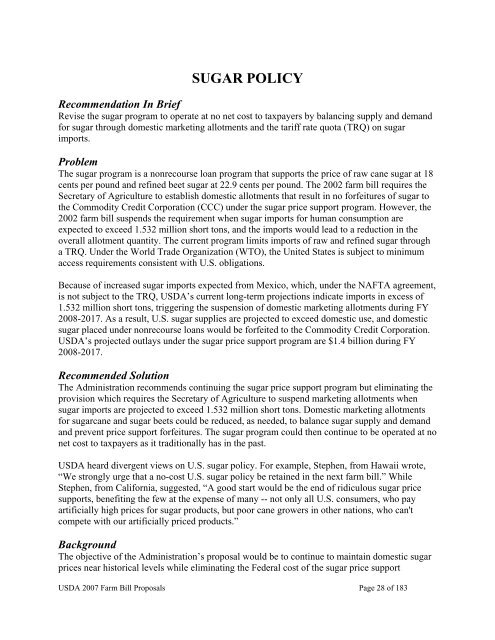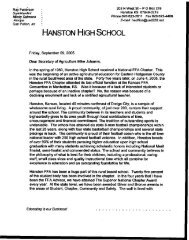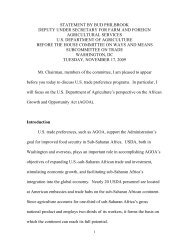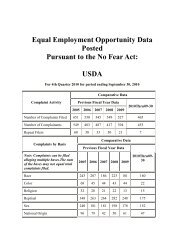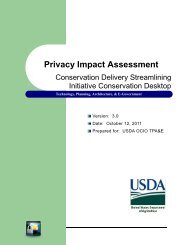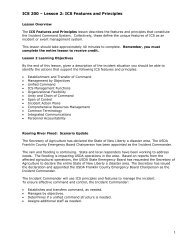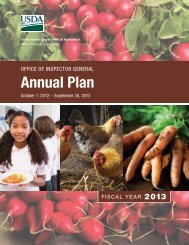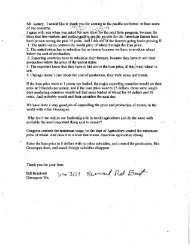USDA 2007 Farm Bill Proposals - US Department of Agriculture
USDA 2007 Farm Bill Proposals - US Department of Agriculture
USDA 2007 Farm Bill Proposals - US Department of Agriculture
Create successful ePaper yourself
Turn your PDF publications into a flip-book with our unique Google optimized e-Paper software.
SUGAR POLICYRecommendation In BriefRevise the sugar program to operate at no net cost to taxpayers by balancing supply and demandfor sugar through domestic marketing allotments and the tariff rate quota (TRQ) on sugarimports.ProblemThe sugar program is a nonrecourse loan program that supports the price <strong>of</strong> raw cane sugar at 18cents per pound and refined beet sugar at 22.9 cents per pound. The 2002 farm bill requires theSecretary <strong>of</strong> <strong>Agriculture</strong> to establish domestic allotments that result in no forfeitures <strong>of</strong> sugar tothe Commodity Credit Corporation (CCC) under the sugar price support program. However, the2002 farm bill suspends the requirement when sugar imports for human consumption areexpected to exceed 1.532 million short tons, and the imports would lead to a reduction in theoverall allotment quantity. The current program limits imports <strong>of</strong> raw and refined sugar througha TRQ. Under the World Trade Organization (WTO), the United States is subject to minimumaccess requirements consistent with U.S. obligations.Because <strong>of</strong> increased sugar imports expected from Mexico, which, under the NAFTA agreement,is not subject to the TRQ, <strong><strong>US</strong>DA</strong>’s current long-term projections indicate imports in excess <strong>of</strong>1.532 million short tons, triggering the suspension <strong>of</strong> domestic marketing allotments during FY2008-2017. As a result, U.S. sugar supplies are projected to exceed domestic use, and domesticsugar placed under nonrecourse loans would be forfeited to the Commodity Credit Corporation.<strong><strong>US</strong>DA</strong>’s projected outlays under the sugar price support program are $1.4 billion during FY2008-2017.Recommended SolutionThe Administration recommends continuing the sugar price support program but eliminating theprovision which requires the Secretary <strong>of</strong> <strong>Agriculture</strong> to suspend marketing allotments whensugar imports are projected to exceed 1.532 million short tons. Domestic marketing allotmentsfor sugarcane and sugar beets could be reduced, as needed, to balance sugar supply and demandand prevent price support forfeitures. The sugar program could then continue to be operated at nonet cost to taxpayers as it traditionally has in the past.<strong><strong>US</strong>DA</strong> heard divergent views on U.S. sugar policy. For example, Stephen, from Hawaii wrote,“We strongly urge that a no-cost U.S. sugar policy be retained in the next farm bill.” WhileStephen, from California, suggested, “A good start would be the end <strong>of</strong> ridiculous sugar pricesupports, benefiting the few at the expense <strong>of</strong> many -- not only all U.S. consumers, who payartificially high prices for sugar products, but poor cane growers in other nations, who can'tcompete with our artificially priced products.”BackgroundThe objective <strong>of</strong> the Administration’s proposal would be to continue to maintain domestic sugarprices near historical levels while eliminating the Federal cost <strong>of</strong> the sugar price support<strong><strong>US</strong>DA</strong> <strong>2007</strong> <strong>Farm</strong> <strong>Bill</strong> <strong>Proposals</strong> Page 28 <strong>of</strong> 183


